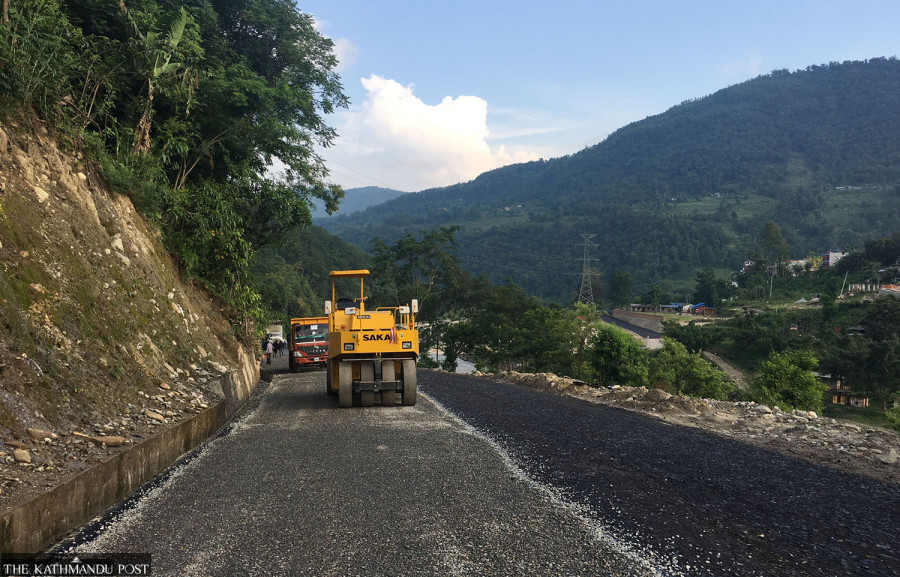Money
Contractors stop work complaining about high prices of materials
The work stoppage may impact the country’s economy at a time when all economic indicators are not performing well, industry insiders say.
Pawan Pandey
Civil contractor Gelje Lama decided to stop work after prices of materials shot up, and the bulldozers at his construction site on the mid-hill highway have remained silent for the past two weeks.
“We have gone on 'construction holiday', and no work is being done. We have requested the government to adjust the prices of the construction materials in line with inflation,” said Lama. “We could go bankrupt if we continue work at the price quoted earlier.”
Lama holds a contract to build a 31-km section of the mid-hill highway in Sindhupalchok district.
Most of the firms attached to the Federation of Contractors’ Associations of Nepal (FCAN) have suspended all construction activities since April 24.
The five-year mid-hill highway project started in 2017, and 80 percent of the physical works has been completed.
According to contractors, prices of some building materials have more than doubled in the past year. Iron rods, which used to cost Rs62 to Rs65 per kg in mid-July last year, now cost Rs130 to Rs135 per kg.
The price of bitumen has jumped twofold to Rs120 per kg.
“All construction materials have become expensive,” said Rabi Singh, president of the association.
The price of diesel used to power earthmovers and vehicles has gone up from Rs111 per litre in mid-July last year to Rs143 per litre, according to Nepal Oil Corporation.
“Until the government fulfils our demand to compensate us for the price rise, we will not return to work,” said Singh.
The construction holiday has affected thousands of construction projects across the country. The work stoppage may impact the country’s economy at a time when all economic indicators are not performing well, industry insiders say.
A halt in construction work means government spending will cease, and the money will remain in the state treasury instead of going to the market. This will not increase economic activities and create jobs, analysts say.
According to contractors, 3,500 out of 5,000 projects across the country have ground to a halt.
“The construction holiday is bad for the country,” said Tulasi Sitaula, a former government secretary at the Ministry of Physical Infrastructure.
“The construction holiday will not only decrease capital expenditure, it will also cause cost and time overruns,” Sitaula said. “It’s bad for the economy.”
The World Bank has stated in its latest Commodity Market Outlook report released on April 26 that the war in Ukraine has dealt a major shock to commodity markets, altering global patterns of trade, production and consumption in ways that will keep prices at historically high levels through the end of 2024.
The increase in energy prices over the past two years has been the largest since the 1973 oil crisis.
According to the data of the Financial Comptroller General's Office which tracks government spending, only 30.98 percent of the budget allocated for capital expenditure had been used as of Monday, nearly 10 months into the fiscal year.
Of the Rs378.09 billion allocated for capital expenditure, Rs117.12 billion has been spent so far. In the same period in the last fiscal year, 34.62 percent of the budget allocated for capital expenditure had been spent.
Capital expenditure in the last fiscal year was 64.69 percent, with 34.7 percent of it occurring in the last quarter, according to the Financial Comptroller General's Office.
Contractors say they have not halted work at 1,500 projects such as bridges, dams and river control schemes which need to be completed before the monsoon sets in.
Arjun Jung Thapa, joint secretary at the Ministry of Physical Infrastructure and Transport, said contractors had stopped work at projects that require iron rods and bitumen in particular.
“We admit materials have become more expensive.”
Construction crews have stopped work when they should be rushing to finish whatever they are doing in the one month remaining before the monsoon, which usually starts on June 10, analysts say.
Low capital spending has also been blamed for the liquidity crunch in the banking sector.
Experts say that low capital spending may significantly impact the country’s economic growth although the government has projected a growth rate of 5.8 percent, much higher than what international agencies like the World Bank, the Asian Development Bank and the International Monetary Fund have projected.
“Both sides–the government and contractors–have many shortcomings. While the government is responsible for one-third of the problems, the remaining two-thirds have been generated by the contractors themselves,” said Sitaula.
"Contractors do not complete the contracts on time and blame others," he said. “The government has made two mistakes—first, not paying the contractors on time, and second, issuing tenders haphazardly without considering the financial resources or proper planning."
According to Sitaula, the contractors' concerns regarding inflation are genuine. “But there is a legal mechanism to address the sudden price hike,” he said.
In 2008, the price adjustment guidance was introduced to legally address unexpected price increments in projects.
Dhundi Prasad Niraula, spokesperson for the Ministry of Finance, said he was not updated on the construction holiday issue. “But capital expenditure will definitely drop if construction activities are halted,” he said.
“There are many issues with builders. A committee has been formed to address their grievances,” said Bishnu Prasad Koirala, spokesperson for the Public Procurement Monitoring Office. “We have already held several rounds of talks to sort out the issues. The relevant issues will be addressed.”
According to Singh, negotiations have been progressing positively. “We are optimistic that the issues will be resolved after the election.”
The second local polls after the country became a federal democratic republic are slated to be held on Friday.
The contractors say they will not continue their protest if the government assures them in writing.
"The government needs to pay contractors around Rs30 billion for various projects," said Singh. These amounts are outstanding from projects that began four to five years ago.
According to Singh, the burden of the increased prices can be shared between the contractor and the government. “Contractor can bear 10 percent of the increase in prices and the government should bear the rest.”
But according to Thapa, Singh’s suggestion is not justifiable.
“There is an automatic provision for addressing inflation issues,” said Thapa.
According to Nepal Rastra Bank, the year-on-year consumer price inflation reached 7.14 percent in the first eight months of the current fiscal year ended mid-March as compared to 3.03 in the same period in the last fiscal year.
The wholesale price of construction materials increased by 24.24 percent year-on-year.
“While the prices of rods, bitumen and fuel have skyrocketed, other construction materials have not become so costly,” said Thapa.




 13.12°C Kathmandu
13.12°C Kathmandu













